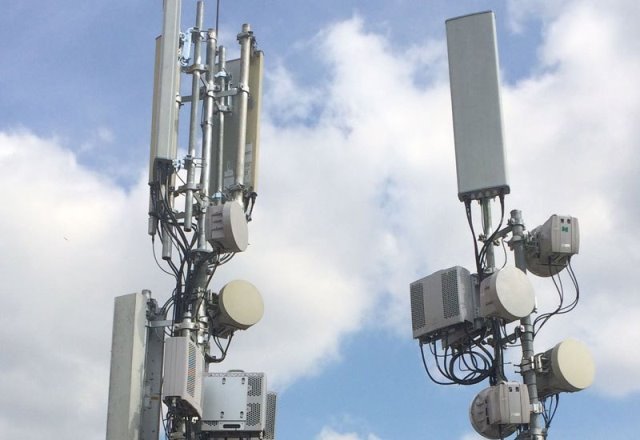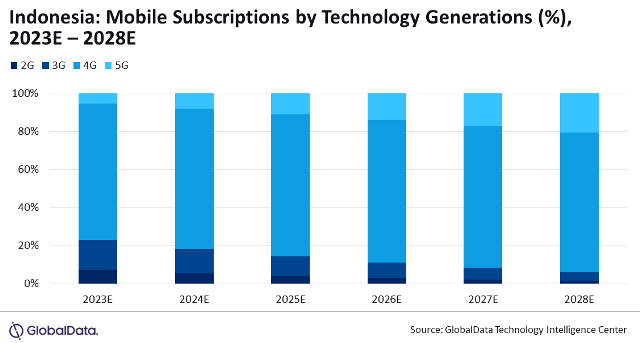Telecom operators such as XL Axiata, Telkomsel, and Indosat are ramping up their network investment in Indonesia, according to TelecomLead.com Research.

Mobile service revenue in Indonesia will achieve a CAGR of 4.3 percent $11.1 billion in 2023 to $13.6 billion in 2028, forecasts GlobalData. Growth drivers will be increase in 4G subscriber base and growth in 5G service adoption.
Mobile voice service revenue in Indonesia will decline at a CAGR of 0.8 percent between 2023 and 2028. There will be steady drop in mobile voice average revenue per user (ARPU) as operators bundle free voice minutes with most of their service plans. Plus, mobile users are using internet-based voice platforms for their communication, the report on telecom industry said.
Mobile data service revenue in Indonesia will grow at a CAGR of 5.8 percent, driven by the consumption of video services and social media content over smartphones.
The monthly mobile data usage in Indonesia is forecast to increase from 11.7 GB in 2023 to 25.5 GB in 2028.
“4G will remain the leading mobile technology, by subscriptions, through 2028 as operators continue with their LTE network expansion plans to extend 4G services to all remote villages and sub-districts in the country,” Kantipudi Pradeepthi, Telecom Analyst at GlobalData, says.
5G subscriptions are projected to reach 21 percent share of the total mobile subscriptions by the end of 2028.

Mobile operators such as XL Axiata, Telkomsel, and Indosat are stepping up their investment to expand their 5G and 4G networks, according to 2023 annual reports of these telecom giants.
Indosat
Indosat said its capital expenditure program focuses on optimizing and enhancing the capacity and quality of cellular, fixed and MIDI network and telecommunications infrastructure.
Realization of capital expenditure amounted to Rp12,783.4 billion, Rp12,010.4 billion, and Rp6,891.5 billion in 2023, 2022, and 2021, Indosat said.
Indosat has allocated the majority of the capital expenditure to focus on cellular network development in high-growth areas, as well as to enhance the quality and coverage of its network.
IOH’s roadmap for 2024 is focused on three key areas: digital transformation, market expansion, and enhancing customer experience. Indosat will focus on improving operational efficiency.
In June 2024, Indosat highlighted its strategic emphasis on enhancing and strengthening 4G network, citing the significantly higher penetration of 4G devices compared to 5G.
XL Axiata
In May 2024, XL Axiata partnered with Ericsson to deploy a dual mode 5G Core solution to ensure flexibility with its 4G and 5G network expansions.
XL Axiata’s capital expenditure was Rp7.16 trillion in 2023 focusing on network expansion. XL Axiata had 160,124 BTS, with 104,993 4G BTS, marking a 10 percent growth from the previous year. This network enhancement, coupled with 61 percent fiberized sites, led to a 21 percent increase in network traffic.
XL Axiata’s 4G BTS in Kalimantan grew 12 percent and traffic 21 percent in 2023. XL Axiata’s green BTS initiative now covers 90 percent since the program was launched in 2014. XL Axiata has deployed 159 thousand kilometers of fiber optic network.
Telkomsel
Telkomsel led the 2023 mobile services market and is poised to lead until 2028 given its strong focus on 4G and 5G network expansions nationwide, GlobalData says.
Telkomsel expanded its 4G coverage to reach 97 percent of Indonesia’s population and launched 5G services in more than 49 cities.
Telkomsel strengthened its network resilience and quality by enhancing the network with upgraded access, machine learning for investment, and efficient resource use. Telkomsel made investments into core and transport network infrastructure to elevate broadband user experience and prevent network disruptions.
In 2023, Telkomsel started the deployment of Massive MIMO 2300 MHz for Fixed Wireless Access (FWA) to ensure high-speed broadband connectivity. Telkomsel revolutionised its network management by using Autonomous Network technology that led to the enhancement of efficiency and customer experience.
Telkomsel completed the 3G migration to 4G throughout Indonesia. Telkomsel has 48,980 2G sites, and 198,492 3G / 4G / 5G sites in Indonesia. Total number of BTS is 247,472 at the end of 2023.
Telkomsel and Huawei signed an MoU to collaborate on exploring cuttingedge network technologies by adopting the “GUIDE to Future Telco” strategy.
Telkomsel invested in new network equipment to enhance its capacity and performance, as well as acquiring the 2.1 GHz and 2.3 GHz frequency bands.
Telkomsel has also augmented its network capacity and performance to meet service demands, strengthened network security through SOC expansion and cybersecurity investments.
Telkomsel has also expanded service coverage and enhanced quality for IndiHome customers, offered cost-effective solutions through network tool consolidation, and optimised network infrastructure to facilitate growth and innovation.
Mobile data subscribers are expecting more investment in advanced mobile network from operators and the government though Internet penetration in Indonesia has reached 79.5 percent (up 2.75 percent) in 2023. Urban internet penetration reached 82.2 percent and 74 percent in rural areas, according to the latest data of the APJII survey.
Baburajan Kizhakedath
